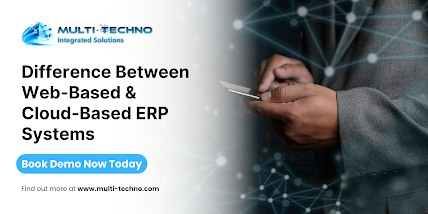Introduction of ERP System & Types
 |
| ERP Software System |
ERP (Enterprise Resource Planning) systems are designed to help businesses manage and automate various business processes, such as financial management, inventory control, and human resources.
There are two main types of ERP systems:
Web-based and Cloud-based. While both types of systems are designed to perform similar functions, there are some key differences between the two that businesses should be aware of when evaluating and choosing an ERP system.
Web-based ERP Systems
Web-based ERP systems are hosted on a remote server and accessed through a web browser. Businesses can access the system from any location with an internet connection, but the software and data are stored on the remote server. Web-based ERP systems are typically owned and maintained by the business, and the business is responsible for managing the hardware and software.
One of the main advantages of web-based ERP systems is that they offer more control over the software and data. Businesses that use web-based ERP systems have full control over the software and data and can customize the system to meet their specific needs. Additionally, web-based ERP systems can be integrated with other on-premises systems and can be customized to fit the unique needs of the business.
In terms of security, both web-based and cloud-based ERP systems are secure, but cloud-based systems may have an edge. Cloud-based ERP systems are hosted on secure servers with high uptime and multiple layers of security, which can provide an added level of security. Additionally, cloud-based ERP systems are updated automatically by the vendor, ensuring that the system is always up-to-date with the latest features and security enhancements.
Cloud-based ERP systems
Cloud-based ERP systems, on the other hand, are hosted on remote servers and accessed through the internet, but the software and data are owned and maintained by a third-party provider. Cloud-based ERP Systems are typically accessed on a subscription-based model and businesses do not have to worry about managing the hardware and software.
Cloud-based ERP systems, on the other hand, offer more flexibility and scalability. Cloud-based ERP systems can be accessed from anywhere with an internet connection, which allows for remote work and collaboration. Additionally, Cloud-based ERP Systems can be easily scaled up or down to meet the changing needs of the business. This can be especially beneficial for businesses that experience rapid growth or changes in demand.
Another advantage of cloud-based ERP systems is that they are typically more cost-effective than web-based systems. Cloud-based ERP Systems often have a lower upfront cost, and the subscription-based pricing model can help with budgeting and forecasting. Additionally, cloud-based ERP systems are maintained and updated by the vendor, which minimizes the need for in-house IT resources.
When it comes to data analytics, cloud-based ERP systems often provide better analytics capabilities than web-based systems. Cloud-based ERP systems can provide real-time data on key business metrics, costs, and customer satisfaction, which can be used to improve decision-making and business performance.
Conclusion
In conclusion, both web-based and cloud-based ERP systems offer different advantages and disadvantages. Businesses should carefully evaluate the different options and choose the one that best fits their specific needs. Web-based ERP systems offer more control over the software and data, but cloud-based systems offer more flexibility and scalability. ERP systems also tend to be more cost-effective and offer better data analytics capabilities. Ultimately, the choice will depend on the specific needs and priorities of the business.




0 Comments
Say Good Ideas to your Comments.